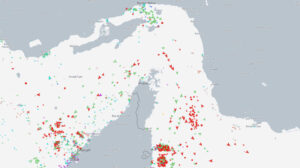Washington expressed concern at the possibility of Turkey expanding its drilling activities in the Greek continental shelf and in the Aegean Sea, as Matt Palmer, the assistant secretary of state for Eurasian affairs and US special envoy for the western Balkans, said. Mr. Palmer is in Athens for a series of meetings.
In particular, Mr Palmer pointed out that Washington expressed its views to Ankara that such a move, namely the extension of drilling on a Greek continental shelf, would be “extremely provocative”. He repeated that the US publicly condemned the Turkish drillings as provocative and undermining the confidence it should have in the Cyprus negotiations.
In fact, he added, especially drilling within 12 nautical miles of Famagusta is clearly illegal. He noted that the US-Turkey relationship is “difficult but important”, while stressing that the difficulties lie in a number of issues, such as the supply of Russian equipment, the Cypriot EEZ, Syria, Venezuela and Iran.
Mr Palmer described the Eastern Mediterranean in the current period as “a strategic space for competition between major powers”, while referring in particular to Greece’s leadership in the Balkans. He described the Prespa Agreement as the most important decision taken in the Balkans since the Dayton Agreement (1995), while expressing his disappointment at the failure of the EU to give a European perspective to Tirana and Skopje.
Mr Palmer stressed that the ideal occasion for reconsidering the dual candidacy of Tirana and Skopje would be the March 2020 Session. Coming from Skopje, Pristina and Belgrade, where he was earlier, Mr Palmer spoke of the “strategic cost” the EU will have if it does not start the accession negotiations for the Western Balkans.
Regarding the possibility of a change of government in Skopje after the April elections, Mr. Palmer said that in any event, Washington would point out that it expects the Prespa Agreement to be fully implemented.
Mr Palmer also referred to Athens’ relations with Moscow and Beijing, noting that China and Russia “are not allies and partners like the US”. He emphasized that Greece should not grant these countries opportunities to exert pressure through agreements such as those for 5G networks.
Ask me anything
Explore related questions





